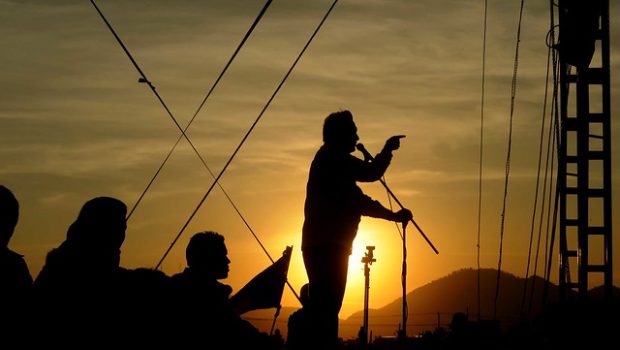The endgame in Syria
Desenlace en Siria
Hélène Dieck
Back to the pre-Arab Spring era?
In 2010, a young Tunisian street trader publically killed himself to protest against police harassment, sparkling a movement that eventually led to the demise of the Tunisian authoritative regime and spread across the region, from Libya to Kuwait and Egypt. If the Syrian war originated in this “Arab Spring”, it eventually took a different turn. Unlike Tunisia or Libya, the Assad regime was capable to resist the civil uprising and profit from the rise of the jihadist fighters. The rationale evolved from an oppressive and abusive war against a democratic movement to a war against Islamists known as ISIS.
Indeed, almost three years ago, the jihadists, once a minority in the coalition against the government forces, proclaimed an Islamic State in Iraq and Syria, and soon fueled most financial and human resources for the fight against al-Assad. The Syrian President was also able to rely on the Russian forces to fight the extremists. This new reality led the U.S.-led coalition to launch airstrikes, eventually killing around three quarters of ISIS fighters. While the Obama Administration was determined throughout its eight years in office to limit U.S. military involvement in world affairs, the Trump Administration already decided to send 400 additional troops to Raqqa, effectively doubling the number of boots on the ground.
As military forces are now closing in on ISIS’ strongholds in Mosul and Raqqa, finding a realistic end state for the Syrian civil war becomes more pressing. The Syrian Democratic Forces, constituted of Kurds and Arab tribes, are now surrounding Raqqa, the capital of the caliphate, while Mosul, ISIS’ stronghold in neighboring Iraq, is thought to be soon in the hands of the Iraqi forces again, partly thanks to the US led coalitions’ military support.
Six years after the Arab Spring, however, international support for democratic aspirations has been replaced by a far more pessimistic outlook on the outcome of such movements. Indeed, world leaders have grown more realistic about the benefits of a civil war. In Libya for instance, two political systems coexist. Benghazi, where the uprising originated in 2011, is now witnessing daily abductions and summary killings, torn between Islamist militias and armed groups on one side and the UN-back governmental forces on the other.
The Syrian conflict has led to a major refugee crisis, not only in the neighboring countries, but also in Europe. In total, 4 million Syrians have fled their country, and 250,000 people died as a result of the civil war. Although public opinion is generally sympathetic to the plight of civilians caught in the middle of the war, particularly after the fall of Aleppo, no country is ready to undertake a new full-fledge war after Afghanistan and Iraq. The Obama Administration strongly opposed Bashar al–Assad and the U.S. official policy was to reject any political solution that included him remaining in power. Even though the candidate Donald Trump has vowed to “bomb the s***t out of” ISIS, and kept Obama’s senior officials leading the U.S. policy towards ISIS, he is now showing signs that President Assad staying in power is inevitable: “With respect to Assad, there is a political reality that we have to accept,” said the White House Press Secretary, adding that “The United States has profound priorities in Syria and Iraq, and we’ve made it clear that counterterrorism, particularly the defeat of ISIS is foremost among those priorities“.
Six years after the beginning of the civil war, the Alawite President is now perceived as part of the solution in a deeply divided state. Indeed, three major religious groups cohabit in Syria: the Kurds, who constitute a minority in Turkey, Iraq, and Iran, the Sunnis, from which most of the jihadists emanate, and the Shiites, to which President Bashar al-Assad’s sect belongs. Given the difficulty to find a political solution that would be accepted by all factions, President Assad is now considered the only stable future for Syria. As a result, U.S. and Russian interests are now surprisingly aligned. From a Western perspective, the return of Syria to its pre-Arab Spring status quo would have the advantage of making possible the return of millions of refugees and allowing al-Assad to gain control over the Islamists that once threatened to gain power over the region.
If ISIS is defeated, however, European leaders are wary that its citizens that joined the fight will bring back home their terrorist tactics and ideology, fueling a new wave of terrorist attacks. Meanwhile top ISIS commanders are preparing for a stateless Islamic state in Iraq and Syria based on an underground resistance. They will be able to count on over a fifth of the population that supports the Islamic State in Syria. Others might contemplate joining forces with Al Qaeda. Finally, other groups are targeting fragile, post-Arab Spring states such as the Islamic State in Northern Sinai in Egypt and other wilayats in Libya. Beyond ISIS fighters, ISIS ideology is also influencing lone-wolf-like attacks in the West, such as the ones in San Bernardo and Orlando in the U.S. or in Nice in France. Although the terrorists had little ties with Syria and no direct ties with ISIS’ hierarchy, the extremist group was quick to declare that the attacks were perpetrated in the name of their organization. The many civilian deaths that occurred following U.S. airstrikes in Mosul or Raqqa since the Trump Administration took office, however, is likely to be used by ISIS and Al Qaeda ideologues to continue recruiting jihadists in the Middle East or even the West.
The upcoming battle of Raqqa, which might prove particularly long and deadly, will be a test for democratic forces against an ideology that takes advantage of any mishap of the U.S. and its allies to raise propaganda against the American “crusaders” attacking Muslims. Given the rhetoric and offensive policy of the current U.S. President, the ability of ISIS to recruit from any mishap is likely to be further magnified.
 Hélène Dieck received her PhD from Sciences Po, Paris, France. She was previously responsible for elaborating military doctrine at the French Ministry of Defense and served as a visiting researcher at the RAND Corporation, Washington, DC. She currently works as a migrant welfare specialist at Qatar Foundation and recently published The influence of public Opinion on Post Cold War U.S. military interventions (Palgrave, 2015).
Hélène Dieck received her PhD from Sciences Po, Paris, France. She was previously responsible for elaborating military doctrine at the French Ministry of Defense and served as a visiting researcher at the RAND Corporation, Washington, DC. She currently works as a migrant welfare specialist at Qatar Foundation and recently published The influence of public Opinion on Post Cold War U.S. military interventions (Palgrave, 2015).
©LiteralPublishing
¿De regreso a la era anterior a la Primavera Árabe?
En 2010 un vendedor ambulante se suicidó públicamente como protesta contra el acoso policial desatando un movimiento que, finalmente, condujo a la desaparición del régimen autoritario en Túnez y se extendió por toda la región, desde Libia a Kuwait y Egipto. Si la guerra siria se originó durante la Primavera Árabe, lo cierto es que tomó un rumbo inesperado. A diferencia de Túnez o Libia, el régimen de Assad fue capaz de resistir al levantamiento civil y sacar provecho del creciente número de militantes yihadistas. La lógica evolucionó desde una guerra represiva y tiránica contra un movimiento democrático a una batalla contra los islamistas de ISIS.
De hecho, desde hace casi tres años los yihadistas –alguna vez una minoría al interior de la coalición contra las fuerzas gubernamentales– proclamaron un Estado Islámico en Irak y Siria destinando de inmediato la mayoría de sus recursos financieros y humanos a la lucha contra al-Assad. El presidente sirio confió a su vez en las fuerzas rusas para combatir a los extremistas. Esta nueva realidad condujo a que una coalición liderada por Estados Unidos realizara ataques aéreos que, finalmente, liquidaron a alrededor de tres cuartas partes de los combatientes de ISIS. Mientras que a lo largo de sus ocho años la administración de Obama limitó la participación del ejército de EEUU en los conflictos mundiales, la administración del Trump ha decidido enviar 400 tropas más a Raqqa, duplicando así el número de efectivos en el terreno.
A medida que las fuerzas militares se están acercando a las fortalezas de ISIS en Mosul y Raqqa, encontrar un final realista para la guerra civil en Siria se vuelve más urgente. Las Fuerzas Democráticas Sirias, constituidas por kurdos y otras tribus árabes, están sitiando hoy a Raqqa, la capital del califato, mientras se cree que Mosul, bastión de ISIS en el vecino Iraq, pronto estará de nuevo en manos de las fuerzas iraquíes, en parte gracias al apoyo militar de la coalición lideradas por Estados Unidos.
Seis años después de la Primavera Árabe el apoyo internacional a las aspiraciones democráticas ha sido reemplazado por una visión mucho más pesimista sobre los resultados de estos movimientos. De hecho, los líderes mundiales se han vuelto mucho más realistas acerca de los beneficios de una guerra civil. En Libia, por ejemplo, coexisten dos sistemas políticos. Benghazi, donde el levantamiento originado en 2011 experimenta ahora matanzas sumarias y secuestros cotidianos, se encuentra desgarrada entre las milicias islámicas y los grupos armados por un lado y las fuerzas gubernamentales y de la ONU por el otro.
El conflicto sirio ha provocado una grave crisis de refugiados no sólo en los países vecinos sino también en Europa. En total, 4 millones de sirios han huido de su país y otras 250.000 personas han muerto a causa de la guerra civil. Aunque la opinión pública es generalmente compasiva con la difícil situación de los civiles atrapados en medio de la guerra, particularmente después de la caída de Alepo, ningún país está dispuesto a emprender nuevamente una guerra formal después de Afganistán e Irak. La administración de Obama se opuso firmemente a Bashar al-Assad y la política oficial de Estados Unidos rechazó cualquier solución política que lo incluyera en el poder. A pesar de que el candidato Donald Trump juró “bombardear la mierda” de ISIS y, siendo ya presidente, mantuvo a altos funcionarios de Obama al mando de la política de EE.UU. hacia ISIS, ahora está dando señales de resulta inevitable que el presidente Assad se mantenga en el poder: “Respecto de Assad, hay una realidad política que debemos aceptar”, dijo el Secretario de Prensa de la Casa Blanca; aunque agregó que “Estados Unidos tiene marcadas prioridades en Siria e Irak y hemos dejado claro ya que la lucha contra el terrorismo, especialmente la derrota de ISIS, es la más importante de estas prioridades”.
Seis años después del inicio de la guerra civil el presidente alauita ahora es percibido como parte de la solución en un Estado profundamente dividido. De hecho, tres importantes grupos religiosos cohabitan en Siria: los kurdos, que constituyen una minoría en Turquía, Irak e Irán; los sunitas, de los cuales emanan la mayoría de los yihadistas; y los chiítas, a los que pertenece la secta del presidente Bashar al-Assad. Dada la dificultad de encontrar una solución política aceptable para todas las facciones, ahora se considera al presidente Assad como el único que garantizaría un futuro estable para Siria. Por su parte, los intereses de Estados Unidos y Rusia se encuentran hoy sorprendentemente alineados. Desde el punto de vista occidental el regreso de Siria a su status quo pre-Primavera Árabe tendría la ventaja de hacer posible el retorno de millones de refugiados permitiendo que, a su vez, Assad asuma el control sobre los islamistas que alguna vez amenazaron con tomar el poder en la región.
Sin embargo, si ISIS es derrotado los líderes europeos temen que aquellos de sus conciudadanos que se unieron a la lucha traigan a casa su ideología y tácticas terroristas, propiciando una nueva ola de ataques. Mientras tanto, los principales dirigentes de ISIS se están preparando para un desnacionalizado Estado islámico en Irak y Siria con base en una resistencia clandestina. Contarían con más de una quinta parte de la población que apoya a dicho Estado Islámico en Siria. Unos más podrían contemplar la posibilidad de unir fuerzas con Al Qaeda. Finalmente, otros grupos tiene como objetivo a Estados frágiles posteriores a la Primavera Árabe, como el Estado islámico en el norte del Sinaí en Egipto y otros vilayatos en Libia. Más allá de sus combatientes, la ideología de ISIS también está detrás de los ataques de algunos lobos solitarios en Occidente, como los de San Bernardo y Orlando en los Estados Unidos o el de Niza en Francia. Aunque los terroristas tenían pocos vínculos con Siria y no existía una relación directa con la jerarquía de ISIS, el grupo extremista se apresuró a declarar que los ataques fueron perpetrados en nombre de su organización. Sin embargo, es probable que las numerosas muertes civiles ocurridas después de los ataques aéreos estadounidenses en Mosul o Raqqa desde que la administración Trump asumiera el poder, sean utilizadas por los ideólogos de ISIS y Al Qaeda para continuar reclutando a jihadistas en Oriente Medio o, incluso, en Occidente.
La próxima batalla de Raqqa, que podría resultar particularmente larga y mortal, será una prueba para las fuerzas democráticas contra una ideología que aprovecha cualquier percance de EE.UU. y sus aliados para encender su propaganda contra los “cruzados” estadounidenses que atacan a los musulmanes. Dada la retórica y la política ofensiva del actual presidente de Estados Unidos, es posible que la capacidad de ISIS para reclutar adeptos por encima de cualquier contratiempo se incremente aún más.
*Imagen de Códice Tuna Colectivo de Arte

Hélène Dieck. Especialista en bienestar migratorio en la Fundación Qatar. Es autora de The influence of public Opinion on Post Cold War U.S. military intervention (Palgrave, 2015). Actualmente trabaja como especialista en bienestar migratorio en la Fundación Qatar. Es colaboradora de Literal.










